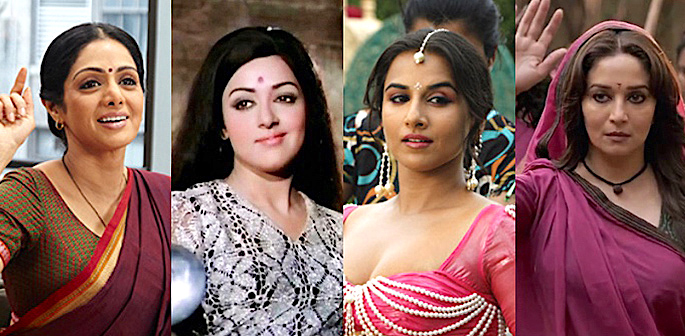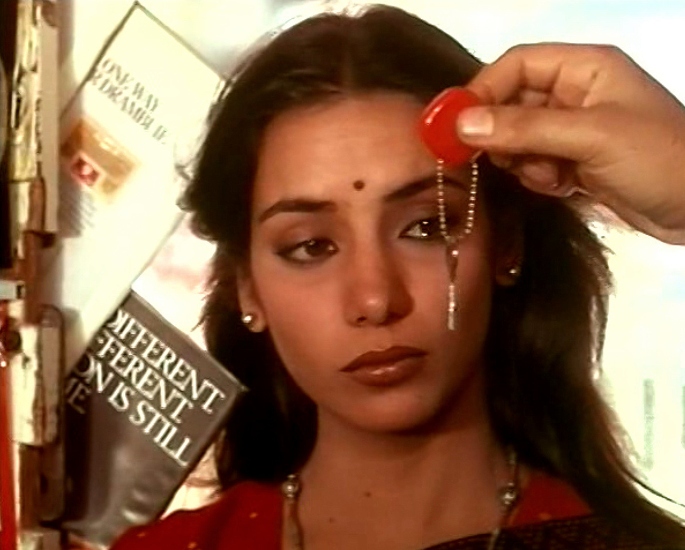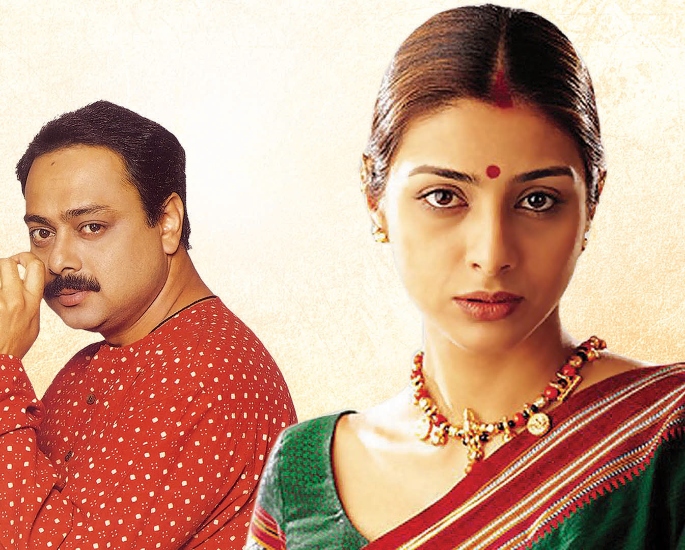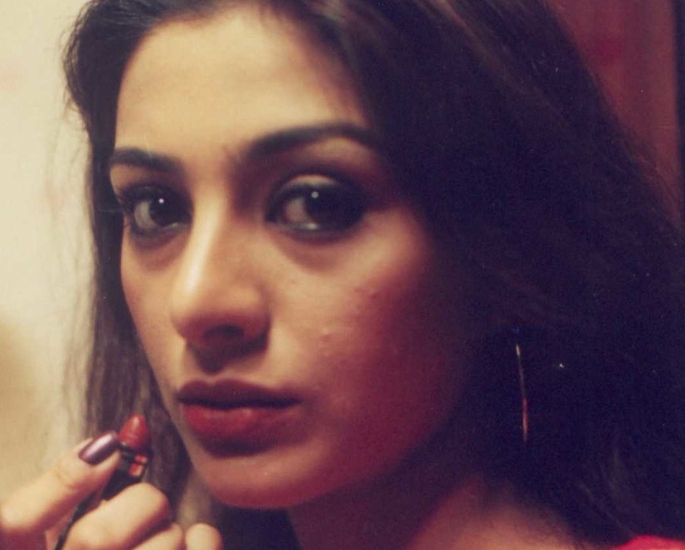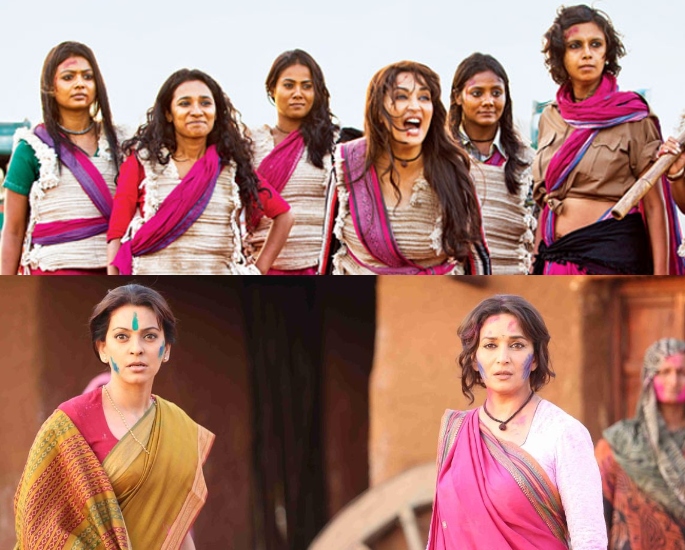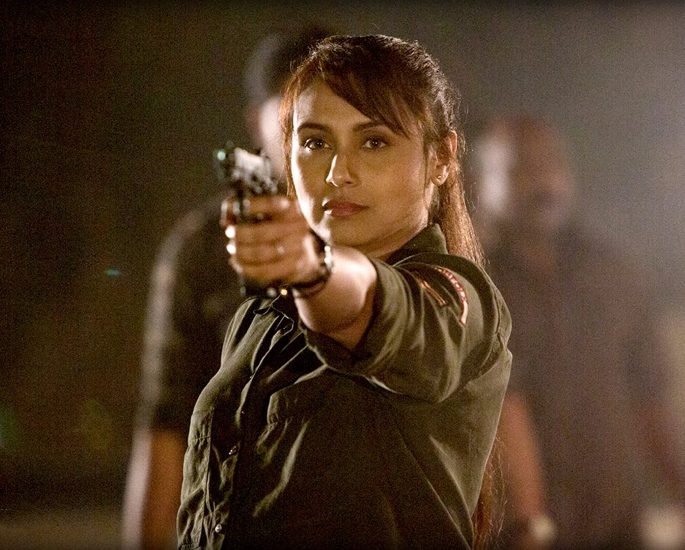"Somehow she overcomes all the difficulties she is facing"
From poor and one-dimensional representations, Bollywood movies began to enhance women empowerment over time.
For example, in the 90s to early 2000s, female leads in movies were primarily the hero’s “love interest.” And being the “love interest” was their primary role.
However, certain gems have come sprinkling throughout the different eras.
Exploration of past and present Bollywood films show there are noteworthy movies that showcase female empowerment. This is done through female leads and secondary female characters.
Such films illustrate that female empowerment can come with a loud bang, and as a gentle wave. The ripple effects of both can be potent.
In the past, there were sporadic sparks of brilliance where films depicted female empowerment. In contemporary times, more Bollywood films showcase strong and brilliantly fierce women.
The audience’s appetite for films where women are not second fiddle to men but shine in their own right is being increasingly met.
Here DESIblitz highlights the top 25 Bollywood films, showcasing women empowerment.
Mother India (1957)
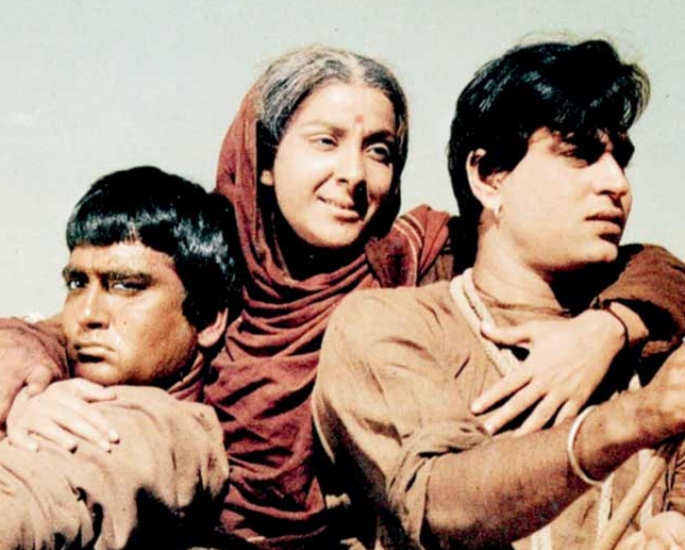
Director: Mehboob Khan
Stars: Nargis, Sunil Dutt, Raaj Kumar, Rajendra Kumar, Sheela Naik, Kanhaiyalal, Chanchal
Mother India is an iconic movie and a remake of Aurat (1940). Both films are a direction of Mehboob Khan.
The original storyline saw a change, as the female protagonist wins the support of neighbours due to her fortitude.
Radha (Nargis) and Shamu (Rajendra Kumar) take a loan out to pay for their wedding from greedy moneylender Sukhilala (Kanhaiyalal). This is an action that they regret later.
Unable to pay the mounting interest rates, the couple struggle immensely.
Shamu works in the fields in an attempt to alleviate their poverty but suffers a severe injury. As a result, he loses both arms, rendering him incapable of work.
Humiliated by the inability to provide for his family, Shamu abandons them. During a time and culture where the man takes care of the family, he feels emasculated.
Subsequently, Sukhilala makes life difficult for Radha, asking for sexual favours in place of money. She immediately rejects Sukhilala’s indecent proposal.
Throughout all she suffers and endures, Radha maintains her integrity and resilience.
Radha’s son Birju (Sunil Dutt) kidnaps Sukhilala’s daughter Rupa (Chancal) from her wedding. Birju wishes to avenge his mother’s mistreatment.
However, Birju’s embittered actions jeopardise Radha’s painstakingly earned goodwill from the village and izzat (honour).
Radha pleads with Birju to release Rupa and not harm her izzat – here izzat encompasses the chastity and respectability of both women.
When Birju refuses, in a shocking move, Radha shoots her beloved son in a spectacularly fatal shot.
Thus, as Radia Times reviewer David Parkinson puts it Radha became “a symbol of national pain and perseverance.”
Radha also became an emblem for female empowerment and fortitude.
Mother India is a cult classic. Though, it does become marred in stereotypes of the mother, maternal feelings and women’s bodies/chastity being sources of izzat.
The film won the 1957 All India Certificate of Merit for ‘Best Feature Film’ and the 1957 Filmfare ‘Best Film’ Award.
Mother India was also the first-ever Indian film to gain a nomination for the Academy Award under the ‘Best International Feature Film’ category.
Seeta Aur Geeta (1972)
![]()
Director: Ramesh Sippy
Stars: Hema Malini, Dharmendra, Sanjeev Kumar, Satyendra Kappu, Manorama, Pratima Devi, Radhika Rani, Honey Irani
Seeta and Geeta (Hema Malini in a dual role) are twin girls who unknowingly part ways at birth.
Whilst Seeta is timid and shy, Geeta embodies woman power. Geeta as a free spirit is also spunky, spontaneous, and forthright.
Seeta and Geeta’s biological parents are dead. So, Seeta is living with her Dadi Ma (Pratima Devi), vile aunt Kaushalya (Manorama), and other members of the family.
She is an heiress yet her meek nature means Kaushalya finds it easy to treat Seeta like dirt. Kaushalya and her daughter Sheila (Honey Irani) both treat Seeta as a slave.
Seeta is the weak-as-water type of heroine that will have many grinding their teeth. Luckily, the stereotypical character of Seeta has a counterbalance through the wonderfully brave Geeta.
When the two sisters unexpectedly find themselves mistaken for each other, the fun truly starts.
Seeta after trying to commit suicide finds herself in the home of Geeta’s poor but warm-hearted mother (Radhika Rani).
While Geeta ends up at her biological parents’ family home, mistaken for Seeta.
Geeta seeing the horrible nature of her aunt decides to stay. She makes this decision to protect Dadi Ma and give the villains a taste of their own medicine.
Through Geeta, the traditional male hero trope that dominated in Indian cinema is subverted.
Geeta teaches the villains a lesson, rescues Seeta, and ensures the ending is a happy one. Geeta’s love interest, wealthy doctor Ravi (Sanjeev Kumar), never overshadows Geeta as a character.
This is a film that showcases female strength and energy through Geeta. Thus, it is no surprise that Hema’s twin role won her the competitive ‘Best Actress’ at the 2oth Filmfare Awards in 1973.
Arth (1982)
Director: Mahesh Bhatt
Stars: Shabana Azmi, Smita Patil, Kulbhushan Kharbanda, Rohini Hattangadi
In every essence, Arth was ahead of its time. The semi-autobiographical film was based on director and writer Mahesh Bhatt’s own extramarital relationship with actress Parveen Babi.
Bhatt told Filmfare in an interview that he took inspiration from a key personal episode:
“Arth dug into my own wounds, my life burns. I had the audacity to use that as fuel. The emotional truth has been sourced from my life.”
Shabana Azmi plays Pooja Inder Malhotra, who has always dreamt of owning her own home. Her husband, Inder Malhotra (Kulbhushan Kharbanda), finally makes Pooja’s dream come true.
The problem is that the money for the house has come from Kavita Sanyal (Smita Patil). Kavita is an actress Inder has been cheating on, and for whom he eventually leaves Pooja.
Pooja’s journey and transformation in the film were groundbreaking.
Initially, Pooja is a doormat who moves between blaming herself for her husband’s infidelity and blaming Kavita. By the finish, she is a confident, independent woman.
When Inder comes running back asking for forgiveness and a return to her, she rejects him.
There are many powerful scenes in the film that reflect patriarchy, the fragility of marriage, and showcase female empowerment.
One scene especially stands out when Pooja bumps into Inder and Kavita at a party, has some alcohol, and confronts them.
She screams at Kavita for being a homewrecker and delivers some of the film’s most powerful words:
“Hamare shaastron ke anusaar, patni ko apne pati ki seva mein kabhi ma ka roop dhaaran karna chahiye, kabhi behen ka roop dhaaran karna chahiye aur bistar mein, randi ka roop dhaaran karna chahiye, jo yeh poora kar rahi hai!”
Translated this means:
“According to our scriptures, a wife serving her husband has to sometimes be his mother, sometimes his sister, and in bed, a prostitute, which [Kavita] is doing!”
The scene is searing and shows how within patriarchy, the blame prominently comes on the woman (Kavita). Yet, the truth is, it is Inder’s infidelity. He is the one betraying the sacraments of marriage.
Arth also beautifully touches on the gender inequality that exists regarding infidelity and ideas of forgiveness (ideas that remain).
Indeed, this is shown when Pooja asks Inder if the roles were reversed. If she was cheating on him, would he take her back?
Arth was a box-office hit, with Shabana Azmi winning ‘Best Acress’ at the 30th National Awards in 1982 for her powerfully compelling performance.
Mirch Masala (1987)
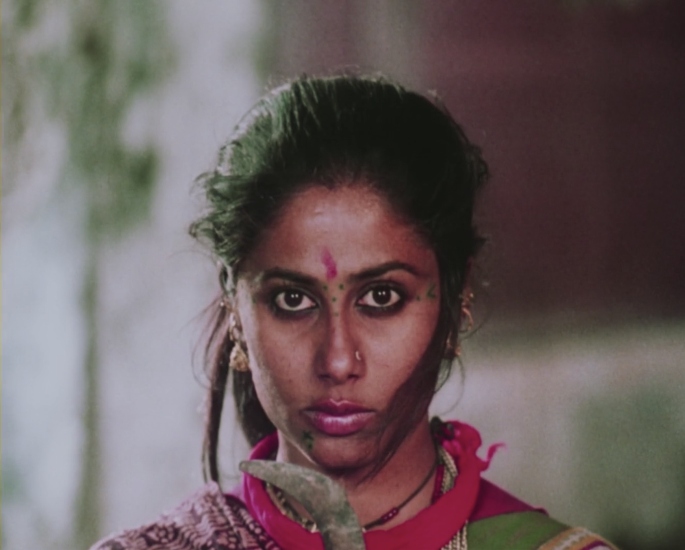
Director: Ketan Mehta
Stars: Smita Patil, Ratna Pathak Shah, Naseeruddin Shah, Om Puri, Suresh Oberoi, Benjamin Gilani
Mirch Masala is one of the classic women empowerment Bollywood movies. A rural Gujarat village in the early 1940s during the British Raj is the setting of the film.
A group of British tax collectors and fellow Indians called Subedar have control of the village, harassing the women and bullying others with their power.
The main Subedar arrogant (Naseeruddin Shah) takes an interest in one of the village women, Sonbai (Smita Patil), who is already in wedlock.
Sonbai is an intelligent, beautiful, and strong woman. Her confidence intrigues the Subedar.
The village schoolmaster (Benjamin Gilani) who is a follower of Gandhi Ji believes in teaching all children how to learn. This includes even girls in the otherwise illiterate village.
Soon things escalate as Sonabai challenges the Subedar’s authority and it is up to the villagers, especially the women in standing up to their authoritarian enemy.
Sonbai is no sweet simpering village girl. Rather, she is a fierce woman who knows her own worth. She will not submit or give in.
Sonbai’s presence onscreen is dynamic, as she fights with all her might. Her kohl-lined eyes are dark with her determination to survive.
The scene of the women throwing spices on Naseeruddin Shah has become iconic.
Seeing the women resist and succeed will have the audience in a delightful mood.
This is a film that details the oppression of women. Hence, the collective stance of female defiance at the end is a culmination of the cruelty the audience view throughout the movie.
Smita missed out on seeing the reaction to her reverting performance, as she died before the film’s release.
However, many will not forget her powerful performance in the timeless, Mirch Masala.
Damini (1993)

Director: Rajkumar Santoshi
Stars: Meenakshi Seshadri, Rishi Kapoor, Sunny Deol, Amrish Puri, Ashwin Kaushal, Prajakta Kulkarni
When Damini Gupta (Meenakshi Seshadri) marries her love, wealthy Shekhar Gupta (Rishi Kapoor), she is ecstatic.
However, life takes an unsuspecting turn for Damini, shattering her life. Damini witnesses her brother-in-law Ramesh Gupta (Ashwin Kaushal), gang-raping their maid Urmi (Prajakta Kulkarni).
Damini wants justice but Shekhar and his parents conspire to hide the truth. The brutality of the rape and Urmi’s treatment by the Gupta family and the media is infuriating and emotive.
In an attempt to silence Damini, she faces harassment and pressure, ending up at a mental institution where she nearly dies. Though lawyer, Govind (Sunny Deol), comes to her rescue and she fights for justice and truth.
The film depicts female empowerment, resolve, and strength amazingly through Damini. She never gives up and refuses to bow down to pressure to stay silent.
However, the film crucially disempowers one woman – Urmi.
The tale is about Urmi’s rape, yet she does not take centre stage before she dies. Rather, Damini the activist has the privilege to forefront her case.
Govind is key to Damini not being silent, as she is able to voice herself thanks to his support. The film is powerful in its examination of issues that still impact Desi women and communities.
The film has become iconic for being one of the first Bollywood movies to openly discuss issues of rape. What’s more, the character of Damini has become synonymous with female power and strength.
Astitva (2000)
Director: Mahesh Manjrekar
Stars: Tabu, Sachin Khedeka, Mohnish Bahl, Namrata Shirodkar
Bollywood films have explored the subject of extra-marital affairs like Kabhi Alvida Na Kehna (2006). However, Astitva is more progressive in its depiction.
The tale focuses on Aditi Pandit (Tabu) and her husband Shrikant Pandit (Sachin Khedeka).
Ambitious and a chauvinist, Shrikant focuses on work at the expense of his wife. In her loneliness, Aditi begins an affair with her music teacher, Malhar Kamat (Mohnish Bahl), and becomes pregnant.
Aditi attempts in confessing to Shrikant, but he is so excited about the tw0 becoming parents that he does not listen to her.
Though, the couple’s life comes to a grinding halt when a will arrives from the lover of Aditi. The deceased love has left her everything.
The hypocrisy of Shrikant is clear. He too had an affair, yet he views Aditi’s affair as much worse.
Moreover, Shrikant never pauses to consider why Aditi had an extra-marital affair. He does not take any responsibility for how he refused to let her work out of pride.
Nor does he acknowledge leaving her alone for years when he was travelling. Aditi points out the difference in treatment meted out to women and men under circumstances of adultery.
The film interestingly highlights that a woman is more than a wife and mother. It shows a woman’s world should not and is not revolving around a man.
The film also highlighted female solidarity, with one of Aditi’s greatest supporters being her to-be daughter-in-law, Revati (Namrata Shirodkar).
The monologue in the climax where Aditi finally questions Shrikant is powerful. She never queries his transgressions but rather questions his narrow viewpoint.
At the end of the monologue, Aditi decides to live life on her own terms and walks out of her marriage.
The film remains socially relevant and gives us a captivatingly realistic character in Aditi. Tabu fantastically displays dignified anger and strength.
Lajja (2001)
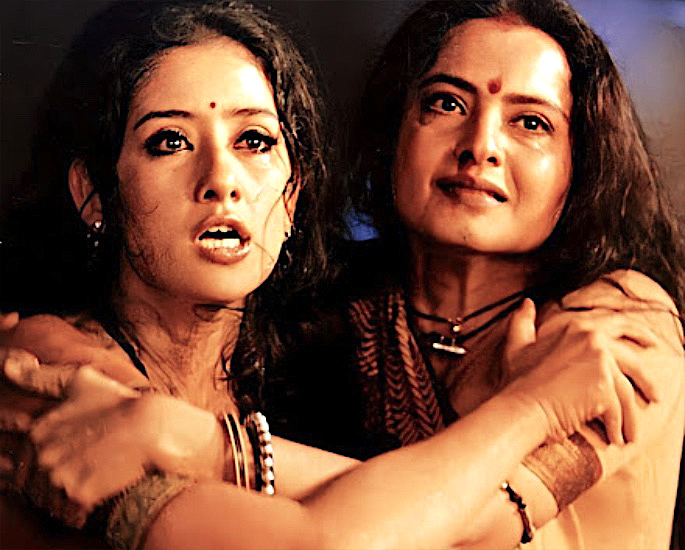
Director: Rajkumar Santoshi
Stars: Manisha Koirala, Rekha, Madhuri Dixit, Mahima Chaudhry, Anil Kapoor, Jackie Shroff, Ajay Devgn
Through the stories of four women, we see a powerful depiction in Lajja of issues many Desi women face. Issues delved into include rape, molestation, ideas of izzat (honour) and the emphasis on dowry.
Pregnant Vaidehi Chautala (Manisha Koirala) acts as the conductor for the film, escaping from her morally corrupt husband Raghu Veer ‘Raghu’ Chautala (Jackie Shroff).
Vaidehi on the run meets some amazing women. Through these encounters, she discovers the harmful realities of women living in a patriarchal society.
Vaidehi also sees the fortitude, determination, power and courage that women can embody.
Vaidehi meets Maithili Rawat (Mahima Chaudhary) who dreams of marriage and having her own family. However, things come to a crossroads, when the groom’s family demands more for her dowry.
The scene where Maithili has enough and confronts the groom’s family is powerful.
Vaidehi also meets Janaki (Madhuri Dixit), a small stage actress, who does not conform to cultural gender norms. Janaki’s community sees her as a Scarlett woman.
In turn, Vaidehi meets fierce Ramdulari (Rekha), a village midwife. She shuns female infanticide, speaks English and encourages her fellow women to obtain self-dependence.
It’s a strong film, however, the typical Bollywood ending of the movie does not work for all.
Anisa Begum*, a 26-year-old Birmingham based Pakistani feels the ending weakened the points the film made:
“The movie was intense.”
“I loved the scene where Mahima Chaudhry at her wedding has enough and tells the soon to be in-laws to sod off.
“But the fact that Raghu does a complete u-turn and Vaidehi goes back to him, just didn’t work for me. It didn’t feel right, authentic.”
The film even with its issues is captivating, with the star-studded cast giving strong performances.
Chandni Bar (2001)
Director: Madhur Bhandarkar
Stars: Tabu, Atul Kulkarni, Rajpal Yadav, Shri Vallabh Vyas, Suhas Palsikar
Chandni Bar is a gritty and deeply powerful film that sheds light on the dark lives of women who are ensnared in Mumbai’s underworld.
Tabu plays Mumtaz Ali Ansari, a village girl, whose family is killed in communal riots. She moves to Mumbai with her uncle, Irfan Mamu (Suhas Palsikar).
Desperately poor, Mumtaz’s uncle persuades her to become a bar girl at Chandni Bar, promising it is only short-term. However, the uncle lies, as he lives off her earnings, drinks and then rapes her.
By the time of the rape, Mumtaz catches the eye of gangster Potiya Sawant (Atul Kulkarni). When she tells Potiya what Irfan uncle did, he decides to defend her izzat and kills the uncle.
Knowing male protection is vital for her survival, Mumtaz marries Potiya. She leaves the bar and stays home to raise her two children.
Mumtaz diligently protects her daughter and son from the world of prostitution and gangs. This is to determine a better future for them.
However, her world unravels again when Potiya dies. Sadly, she returns as a bar lady to support her children. Her strength of character and grit draws the audience in.
The ending is bleak but layered with realism. In the end, Mumtaz cannot keep her children isolated from their surroundings.
Mumtaz’s son becomes a killer, with her daughter becoming a bar dancer. While Mumtaz herself turns to prostitution in an attempt to save her son.
Tabu gives another reverting performance as Mumtaz, striving hard to give her children a better future.
Over the years, there has been a lot of talk about women’s empowerment. Chandni Bar subtly reminds the audience that women do not have equal privileges in the level of empowerment they have.
Dor (2006)

Director: Nagesh Kukunoor
Stars: Ayesha Takia, Gul Panag, Anirudh Jaykar, Shreyas Talpade
Dor is a remake of the Malayalam movie titled, Perumazhakalam (2004). The film undertakes a thoughtful exploration of issues around tradition and individual freedom.
At its heart, the film is about two women who strike a connection by an accident, finding emancipation through each other.
Meera Singh (Ayesha Takia) and Zeenat Fatima (Gul Panag) are drastically different women. Meera loses her husband Shankar Singh (Anirudh Jaykar), as a result, of an accident in Saudi Arabia.
An accident, which sees Zeenat’s husband Amir Khan (Shreyas Talpade) receiving a guilty verdict, resulting in a death sentence.
The law of Saudi Arabia means Zeenat can only save her husband if the widow of Shankar, forgives Amir by signing a maafinama (statement of forgiveness).
Her husband’s death drastically changes the life of Meera. Certain customs mean that she has to live with significant restraints on her life – living like the walking dead.
Her in-laws vent their frustration of losing their only bread-winner on Meera. They blame her for bringing bad luck to the family.
In contrast, Zeenat lives by her own choices and makes the decisions. What is wonderful about Zeenat is that she is unapologetic in her way of living.
The friendship the two women develop is beautiful to see, especially as it helps strengthen them both.
The ending where Zeenat extends her hand from the train and Meera grabs it and climbs aboard, will leave the audience smiling.
By jumping on that train, Meera is escaping the shackles of tradition that were choking her.
Female empowerment in Dor comes in a subtle wave that ensnares the viewer. The film strongly highlights the cultural restraints that can still burden female widows and the power of friendship.
Fashion (2008)

Director: Madhur Bhandarkar
Stars: Priyanka Chopra Jonas, Kangana Ranaut, Mugdha Godse, Arbaaz Khan, Arjan Bajwa
Meghna Mathur (Priyanka Chopra Jonas) dreams of getting out of her small Indian town and making it in the world of high fashion. However, her parents have different ideas for her future.
When Meghna wins a local pageant, she heads for Mumbai to convert her dreams into reality. Initially, she finds success and it appears her dreams are coming true.
Though, Meghana has some decisions to make when she finds herself pregnant with her married boss Abhijeet Sarin (Arbaaz Khan).
Meghna’s world unravels, as she begins to drink and take drugs. The downward spiral is one she does come out of.
The film explores feminism and female power in Indian fashion.
Additionally, the film shows female resolve and ambition. Although it does reinforce stereotypes of gay men, models and the fashion industry.
The film does well in showing women who are unapologetically on a quest to succeed in their careers.
For example, Janet Sequeira (Mugdha Godse), knowingly marries a prolific and prominent gay fashion designer (Samir Soni).
Janet’s demeanour is unfazed and determined, as she believes in compromises in her personal life. This is to further enhance her career.
Thus, whilst Janet’s choices are problematic in their symbolism, her unapologetic determination to be successful is engaging.
The ending of the film is optimistic. Meghna is once again successful and it feels like her life is just beginning. The lack of a fairytale ending is refreshing.
English Vinglish (2012)
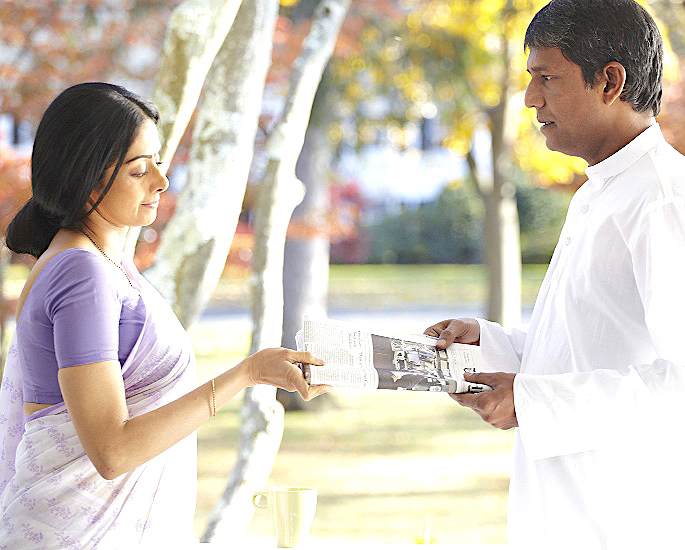
Director: Gauri Shinde
Stars: Sridevi, Adil Hussain, Mehdi Nebbou, Priya Anand, Sapna Godbole, Navika Kotia, Sujata Kumar
English Vinglish follows gentle, even-tempered housewife, Shashi Godbole (Sridevi). Shashi’s family underappreciates her dedication to the family.
Shashi endures small repeated slights from her educated and English-speaking husband Satish Godbole (Adil Hussain) and daughter Sapna Godbole (Navika Kotia).
Husband and daughter mock Shashi’s inability to speak and comprehend English.
As a result, on visiting her sister Manu (Sujata Kumar), Shashi decides to enroll in an English learners class. Through the assortment of people, Shashi meets in the class, she learns to value herself.
The audience sees Shashi as a beacon of female empowerment.
Yet, one can argue that throughout the film Shashi is still seeking validation from her family, and thus does not depict true women empowerment.
Shashi perhaps is developing a surface level of empowerment. One that still maintains the status quo, social norms, and patriarchy.
For example Srajan Bhatnagar in an analysis of the film maintains it is a confirmation of conformity:
“Far from being a film about a woman finding freedom through education and life-changing experiences, the film turns out to be a primer in new-age conformity for housewives in twenty-first-century India.
“These characters are depicted as feminist.”
“However, Shashi is a prisoner of the system and doesn’t challenge any norm.
“The only pleasure she seeks is the happiness of her loved ones; even towards the end of the film, Shashi fails to see herself as a multifaceted individual.”
Contrastingly, most view the movie positively. The Times of India identifies the film, showing women empowerment:
“Somehow she overcomes all the difficulties she is facing and thus emerges as a strong and determined woman and continues with her classes.”
It will be interesting to see what viewers think? How powerful is the depiction of female empowerment through the character of Shashi?
English Vinglish is a Bollywood family film that shows that one should never underestimate a woman.
Kahaani (2012)
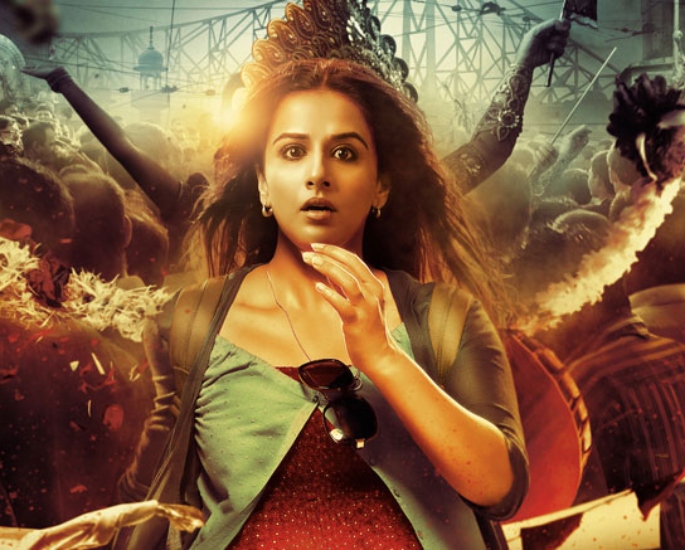
Director: Sujoy Ghosh
Stars: Vidya Balan, Nawazuddin Siddiqui, Indranil Sengupta, Parambrata Chatterjee
In this hit film, pregnant Vidya Venkatesan Bagchi (Vidya Balan), a software engineer, arrives from London to Kolkata to find her husband, Arnab Bagchi (Indranil Sengupta).
Arnab had come to Kolkata to work in the National Data Centre for two weeks and then vanished. Vidya’s first step upon arrival is to file a missing person’s report.
In Kahaani, Vidya has a fierce character, showing why the actress is so popular in Bollywood.
Women empowerment saturates the film, as she surprises everyone, including intelligence cop Mr Khan (Nawazuddin Siddiqui).
Khan suggests Vidya’s husband may have abandoned her. This is something that does not faze her. In a city where lies are layered upon lies, Vidya is strong-minded and determined to find her husband.
Parambrata Chatterjee stands out as the sincere and honest Inspector Satyaki Sinha known as Rana. He helps Vidya in her search by almost putting his job in jeopardy.
But it is Vidya who shines, with her character’s fortitude, resolve, intelligence and grit, drawing the audience in.
In an interview, the actress tells IANS, India remains a work in progress in terms of empowering:
“I think we have a long way to go before every woman in the country feels empowered.”
“But I do think that with each passing day, some woman is discovering her own power, so women’s empowerment is not just a national issue.
“First, it’s a personal issue, then a regional issue, then a national issue, and then a universal one.”
Vidya has starred in films that in different ways depict women’s empowerment.
Chak De! India (2017)
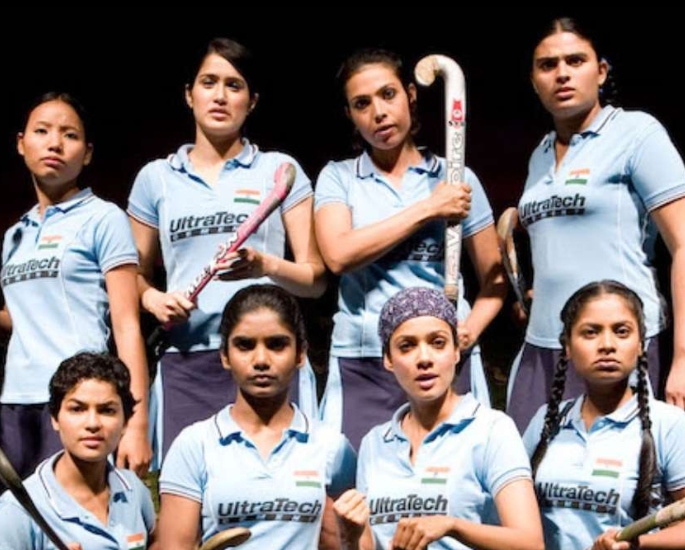
Director: Shimit Amin
Stars: Vidya Malvade, Sagarika Ghatge, Shilpa Shukla, Arya Menon, Seema Azmi, Nisha Nair, Chitrashi Rawat, Shah Rukh Khan
Chak De! India is a women empowerment movie based on the Indian women’s hockey team.
Kabir Khan (Shah Rukh Khan), seven years after he is falsely accused of throwing a game, becomes the national women’s hockey team coach.
Kabir succeeds in convincing a reluctant hockey association to give his female team a chance.
The hockey team is made up of women from across the length and breadth of the country. Each of them is a state champion in their own right.
The women face prejudice and judgement externally but also internally within the team.
As the bond grows between team members, the audience witnesses the potency of female empowerment and resolve.
Chitrashi Rawat who plays Komal Chautala was in fact a real hockey player. A casting coup, Chitrashi’s spunky and fiery portrayal of her character won audiences over.
Shilpa Shukla landed her first major role as the experienced but rebellious player of the team, Bindia Naik.
Overall, the chemistry between the sixteen women draws the viewers in and ensures there are some very entertaining scenes.
The film thoughtfully explores many themes such as feminism and sexism, as well as the legacy of the Indian partition.
In addition, to highlighting racial and religious bigotry, the film also touches on ethnic and regional prejudice.
However, one can argue that the film is focusing more on the redemption of Khan than the women. Nevertheless, the film was still important in getting the audience to think about women in sports.
‘The Chak De! girls’, as they came to be known, together won ‘Best Supporting Actress’ at the 2008 Screen Awards.
The Dirty Picture (2011)

Director: Milan Luthria
Stars: Vidya Balan, Emraan Hashmi, Naseeruddin Shah
The Dirty Picture is a movie that takes inspiration from the life of the late South Indian actress Silk Smitha aka Vijayalakshmi Vadlapatla.
Silk (Reshma) is played by the fabulous Vidya Balan who gives a compelling performance.
Silk is a small-town girl with dreams of stardom. She runs away from home, beginning her career as the raunchiest of item girls.
She also appears to embrace her sexiness and sexuality unreservedly. This contour of women empowerment can be hard to embrace in real life, but Silk does it well on screen.
Helping, and sometimes hurting Silk’s rise is Surya Kant (Naseeruddin Shah), an ageing South Indian film hero.
Silk proves that she is willing to do anything to become a star. Her determination is something that frustrates Abraham, a director with international ambitions (Emraan Hashmi).
The latter half of the film takes a dark turn as Silk turns to drink. From there, things go downhill for Silk, with her ultimately meeting a tragic end.
The film is identified as one of the best Bollywood movies on women empowerment.
Yet, it does not delve into the complexity of Silk’s life.
The film needed to explore how Silk was constrained and shaped by the male gaze. It required to dissect how she internalised male sexualisation of the female body.
In addition, the film could have considered issues of exploitation and inequality in how sexuality for women and men is understood and defined. All this would have added a rich layer to the story.
Nevertheless, Vidya’s performance was strong and the reason why she won ‘Best Actress’ for her role at the 59th National Film Awards in 2011.
No One Killed Jessica (2011)
Director: Raj Kumar Gupta
Stars: Vidya Balan, Myra Karn, Rani Mukerji, Mohammed Zeeshan Ayub
No One Killed Jessica follows the murder of Jessica Lall in 1999 and her sister Sabrina Lall’s subsequent battle for justice.
The real Sabrina Lall plays an important role in the making of the script for the film.
Tending bar at an elite event in Delhi, India, Jessica Lall (Myra Karn) refuses to serve three men after the last call.
One of the men, Manish P. Bharadwaj (Mohammed Zeeshan Ayub), who is the son of a big-time politician, shoots her in the head in response.
Although there are dozens of eyewitnesses, Jessica’s sister, Sabrina Lall (Vidya Balan) discovers corruption. Witnesses are either conveniently forgetful or willing to sell their testimony to the highest bidder.
Consequently, a criminal case that should be open-and-shut is held hostage to greed and political influence.
This in turn leads to Sabrina being trapped in a seven-year-long fight for justice. Determined, resilient, and never giving up, she demands attention.
During this time, Meera Gaity (Rani Mukherjee), a reporter, thinks the case has no story. She reads that the man who shot Jessica dead was free.
Hence, she feels “cheated”, and decides to get justice for Jessica.
The dialogues in this film are explosive and emotive.
The onscreen chemistry between Rani and Vidya is great as both give power-packed performances.
This is one of the top Bollywood women empowerment movies, raising key questions about the continued injustices that exist.
Additionally, the film problematises well the ongoing and prolific violence women face, along with the judicial failures that compound the pain endured by many.
Gulaab Gang (2014)
Director: Soumik Sen
Stars: Juhi Chawla, Madhuri Dixit, Mahie Gill, Shilpa Shukla, Tannishtha Chatterjee
Within a rural village, in Bundelkhand, Uttar Pradesh, India, a pink sari brigade known as the ‘Gulabi Gang’ was formed. The gang was established to fight crime against women by Sampat Pal Devi.
Gulaab Gang is inspired by this famous gang and set in the modern-day badlands of Central India.
Madhuri Dixit plays Rajjo who fiercely fights for women and their rights. Rajjo finds herself battling the corrupt politician, Sumitra Devi (Juhi Chawla).
Sumitra is conniving, manipulative, uncaring, and selfish. She is an onscreen villain you cannot help dislike.
Juhi does well in depicting a character starkly different from what she has played in the past.
When Sumitra arrives in the village, Rajjo meets her. Rajjo lets her know, that a son of a village big shot, had raped an underage girl.
To Rajjo’s shock, Sumitra coolly puts a price tag on the rape, and asks the big shot, to pay the child victim a lump sum. This is not enough for Rajjo, as her gang castrates the rapist.
The scenes concerning the rape and responses to it are powerful. Each moment illustrates the terrible way in which, rape is treated by some politicians in India and elsewhere.
The lead and Bollywood icons, Madhuri and Juhi are what make this film.
Without them, particular scenes may have lost their potency.
The film is a celebration of womanhood, emphasising female autonomy and women empowerment.
Mardaani (2014)
Director: Pradeep Sarkar
Stars: Rani Mukherji, Tahir Raj Bhasin, Prianka Sharma
In Mardaani, Rani Mukherji shines in her role as kickass, no-nonsense Mumbai police officer, Shivani Shivaji Roy.
Shivani is dedicated and ferociously determined. She is attempting to capture Delhi-based kingpin, Karan Rastogi (Tahir Raj Bhasin), who runs an organised crime cartel involving child trafficking and drugs.
She aims to hunt him down and rescue a teenage girl, Pyaari (Prianka Sharma). The young orphan has been kidnapped along with many others by Karan.
Shivani has a close bond with Pyaari after she saved her and then started to take care of her.
Karan, aware that Shivani is continually monitoring his cartel’s activities, phones her, suggesting that she does not interrupt his business.
However, his games and threats do not make Shivani waver. Karan, as a warning, dismembers one of Pyaari’s fingers and sends it to Shivani’s house wrapped in a gift box.
On top of this, Karen arranges for Shivani’s husband to be abused and beaten. But none of this deters Shivani.
How Rani depicts Shivani is truly a sight to see and leaves a lasting impression.
The action scenes in this film are great, with Shivani showing she needs no man to play the hero. She is more than enough to handle her own.
The film is hard-hitting, sharp, and embodies the spirit of female empowerment.
Mary Kon (2014)

Director: Omung Kumar
Stars: Priyanka Chopra, Darshan Kumaar, Sunil Thapa
The film opens with Mangte Chungneijang Kom aka Mary Kom (Priyanka Chopra) in labour, walking towards the hospital with her husband, footballer Onler Kom (Darshan Kumaar).
The movie then shifts to flashbacks to the past and how Mary entered the world of boxing. She meets coach, Narjit Singh (Sunil Thapa), who was the coach of the Asian champion Dingko Singh.
Narjit asks Mary to visit the gym for the next thirty days and says that he will only teach her if she is deserving enough.
After winning the state-level championship, her father confronts Mary for hiding boxing from him. When her father pressures her to choose between him and boxing, she chooses the sport.
After watching Mary’s victorious 2002 Women’s World Amateur Boxing Championship match, her father accepts boxing.
After she wins the 2006 Women’s World Amateur Boxing Championships she gets married. Onler vows to never ask Mary about retiring from boxing.
Once pregnant Mary gives up on boxing to look after her family. However, Mary refuses the position of a police constable, feeling that she deserves better as a former world champion boxer.
Mary struggles with the lack of recognition she gets from people. Thus, Onler encourages Mary to restart training in boxing, as he takes care of the twins.
Mary makes a comeback in the National Boxing Championship. Despite performing better than her opponent, she loses the match due to the apparent partiality of the judges.
As a result, Mary throws a chair in anger towards them, leading to a ban.
In the words of Entropy reviewer John Rufo:
“Mary Kom can represent the classically “feminized” India – she’s a mother, she milks her family’s cows in the morning – but she also represents a kickass iteration of India.”
The idealisation level of womanhood through Mary in some ways is problematic. Though, through Mary, we also see that women are no less than men.
Queen (2014)
Director: Vikas Bahl
Stars: Kangana Ranaut, Rajkummar Rao
Th iconic Queen has become known as a feminist film, reflecting women empowerment.
The film was startlingly different from what had been produced by Bollywood previously. The film remains one that captures the emotions of the audience due to its realism.
Rani Mehra (Kangana Ranaut) is an under-confident young woman from Delhi about to tie the knot.
Two days before her wedding, fiancé Vijay (Rajkummar Rao), tells Rani that he no longer wishes to marry her.
Vijay informs Rani that his lifestyle has changed after living abroad, and her conservative habits may be a wrong match for him.
A shocking Rani shuts herself in her room for a day. Then wanting to take control, she asks her parent’s permission to go alone on a pre-booked honeymoon to Paris and Amsterdam.
After initially hesitating, Rani’s parents agree, thinking that a vacation might cheer her up.
The decision of Rani to head for Europe has a profound effect, allowing her to see the world through new eyes.
Through her solo trip, Rani gains self-confidence, resilience, independence and empowerment.
The movie also subtly illuminates the gender disparity prevalent in Indian and other Desi communities. A well-educated girl leaves a good job opportunity just because her boyfriend does not want her to work.
The transformation of Rani from a rather docile woman to a bold, confident street smart woman is great to see.
Dangal (2016)
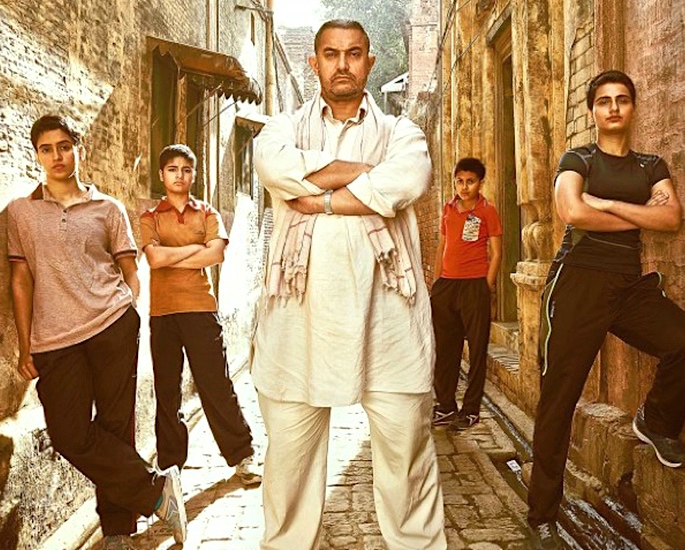
Director: Nitesh Tiwari
Stars: Aamir Khan, Fatima Sana Shaikh, Sanya Malhotra, Sakshi Tanwar, Aparshakti Khurana
Dangal is based on the true story of wrestler Mahavir Singh Phogat, teaching his daughters to wrestle.
His older daughter, Geeta Kumar Phogat, was India’s first female wrestler to win at the 2010 Commonwealth Games.
In the film, Mahavir Singh Phogat is played by the skillful Aamir Khan. Mahavir wants a male heir to follow in his wrestling footsteps.
However, he and his wife Daya Phogat (Sakshi Tanwar) only have daughters.
Mahavir pays the girls little attention. It is not until they show physical strength, that he looks at them as though they are worth something.
Therefore, he decides to train his daughters in the sport. This includes Geeta Phogat (Fatima Sana Shaikh) and Babita Kumari Phogat (Sanya Malhotra).
The film’s critiquing of traditional feminity is problematic. For example, when the girls dress up and go to their friend’s wedding, their father is furious.
Also, when Geeta opts for hair growth and paints her nails, she suddenly begins losing wrestling matches.
Yet, when she cuts her hair again, listening to what Mahavir tells her to d0, she is once again a winner. The film does not really show that feminity comes in many forms.
It would have also been valuable if the film showcased how being feminine in the traditional sense is not a hindrance to sporting success.
Regardless, the film illustrates the irrationality of gender stereotypes that do not see women as sportspeople on par with men.
Geeta and Babita beautifully defy the expectations and stereotypes their fellow villagers hold about them.
Neerja (2016)
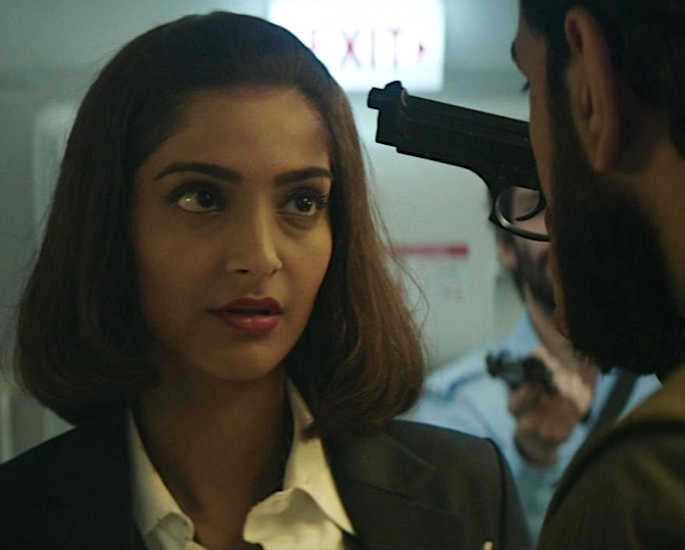
Director: Ram Madhvani
Stars: Sonam Kapoor, Shabana Azmi, Yogendra Tikku, Abrar Zahoor
Neerja is based on the true story of courageous flight attendant Neerja Bhanot. Sonam Kapoor plays Neerja Bhanot, who thwarts a plane hijack, thus saving the lives of 360 hostages.
The 22-year-old Neerja’s mother Rama Bhanot (Shabana Azmi) expresses concern about her job. She suggests Neerja return to her old job of modelling.
Neerja likes her job and gently declines advice from Rama. Boarding Pan Am 73 (Sep 5, 1986), when the plane lands in Karachi, Pakistan terrorists hijack the plane.
Fast thinking Neerja quickly alerts the cockpit and the pilots escape through the overhead hatch. Thus, there is no one to fly the plane.
Later, the terrorists ask the flight attendants to collect everyone’s passports. This is to locate the Americans and hold them hostage.
Neerja and her colleagues collect the passports but skilfully avoid any American passports by kicking them under the seats or down the trash chutes.
In each moment Neerja and the other flight attendants show bravery and resolve.
After many hours the plane loses auxiliary power and the lights go out.
The terrorists believe the Pakistan Army has cut the power to storm the plane. So, the terrorists begin indiscriminately shooting passengers.
At great peril to her own life, Neerja opens the rear door and deploys the chute, and begins directing passengers down it.
Neerja could have escaped by herself but she chose to put the passengers first. In the end, Neerja is shot by the terrorists, as she tries to shield young children from gunfire.
The film highlights the fortitude and bravery of a woman, with Neerja being the ultimate hero.
Mom (2017)
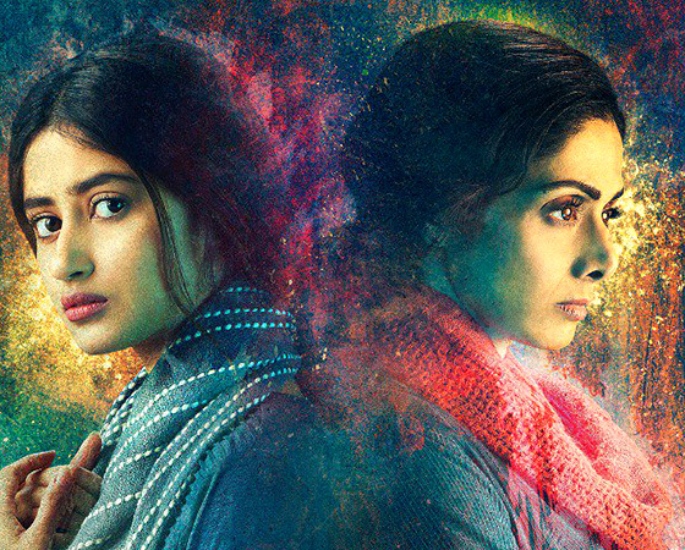
Director: Ravi Udyawar
Stars: Sridevi, Sajal Aly, Akshaye Khanna, Adnan Siddiqui, Adarsh Gourav
Aarya Sabarwal (Sajal Aly) is gang-raped by Mohit Chadha (Adarsh Gourav) and his friends. Mohit “loves” Aarya and cannot stand receiving a “No” from her.
Aarya is critically injured and whilst being in the hospital, the court declares her rapists to be not guilty.
This verdict is given for two reasons, first due to a lack of evidence. And second, because Aarya was drunk that night, thereby negating her testimony.
Aarya’s stepmother Devki Sabarwal (Sridevi) is furious at the outcome. She sets out to destroy the lives of the four perpetrators who walked away free.
There is an intensity to the film and acting that will have the audience feeling absorbed. Whilst the revenge plot is one that none should follow in real life, the movie delves into important social issues.
The movie shows the problematic issue of male entitlement, one that continues to exist.
Mohit thinks of Arya’s rejection and her lack of interest in him as a giant blow to his ego.
Hence, the rape is positioned by the rapists as a way of avenging the blow to Mohit’s ego. It is a powerful example of toxic masculinity.
There is an issue with the film similar to Damini in that the focus is on Devki and not Aarya. The audience needs to see discussions at least about how Aarya was helped and the rehabilitation she would need.
Bollywood films looking at rape need to produce narratives that show the complexity of how victims deal with the trauma.
In doing so, the woman who is raped would not just be positioned as a victim but also as a survivor. Overall, the film packs a punch, as it showcases female empowerment and imbalances in power.
Manikarnika: The Queen of Jhansi (2019)
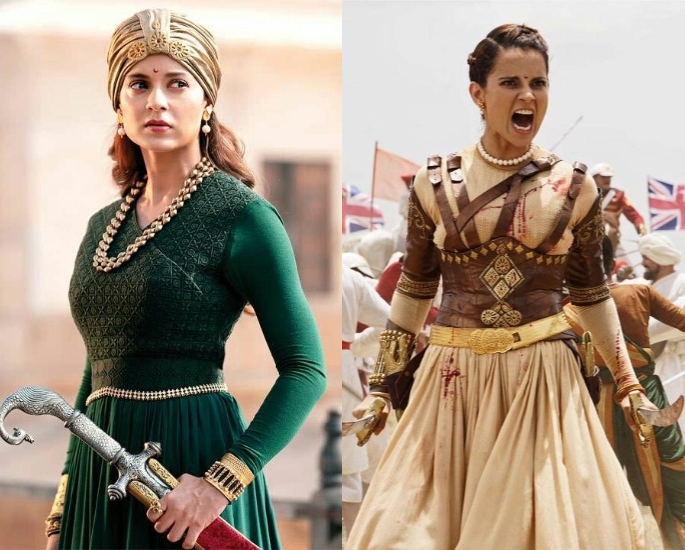
Director: Radha Krishna Jagarlamudi and Kangana Ranaut
Stars: Kangana Ranaut, Jisshu Sengupta, Ankita Lokhande, Danny Denzongpa, Kulbhushan Kharbanda, Edward Sonnenblick
The film is inspired by the real Manikarnika – Queen of Jhansi, famous as Rani Lakshmi Bai of Jhansi.
She is remembered for her determined battle to thwart the British Empire from conquering India.
The film attempts to rekindle Desh Bhakti (patriotism) and nationalism by depicting the story of the queen who fought for the matrubhoomi (mother nation).
Kangana Ranaut as Lakshmi Bai dazzles in her charm, intellect, and warrior nature. She may not win the war but she leaves her mark.
She marries Maharaja Gangadhar Rao Newalkar of Jhansi (Jisshu Sengupta). Not long after giving birth to a boy whom they name Damodar Rao.
Unfortunately, the infant does not live long, leaving the entire kingdom in sorrow.
They adopt a child who becomes the heir. But his lack of biological connection is used by the British to further justify their rule.
The film could have had more depth, but it illustrates female empowerment even from a surface level.
Lakshmi Bai in her actions attempts to shatter patriarchy and misogyny.
She does not obey her mother-in-law’s command to just look after the kitchen or follow the cloistered life of a widow.
Also, the climax where women from the village take part in the battle against the British again showcases that men are not the only warriors.
However, there are times when the film gets its engagement with gender politics wrong. For example, when references are made to how women can ‘fight like men’, rather than just fight well.
There is power in the lead character, but the depiction of it needed to be more multi-dimensional.
Chhapaak (2020)
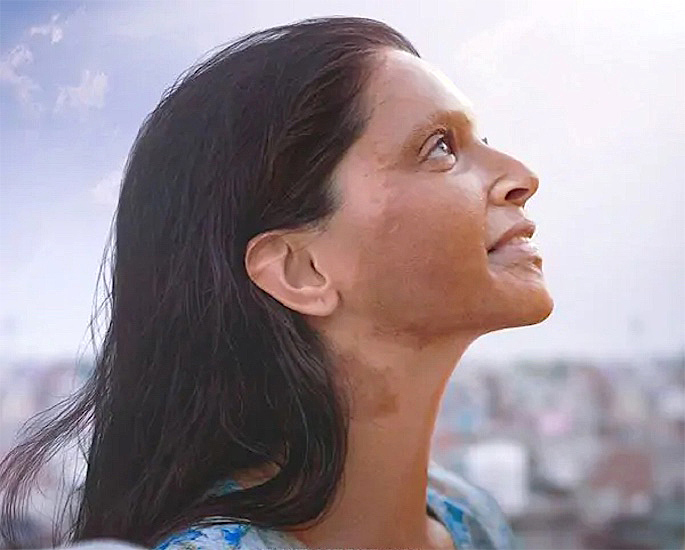
Director: Meghna Gulzar
Stars: Deepika Padukone, Vikrant Massey, Ankit Bisht, Madhurjeet Sarghi, Payal Nair
Chhapaak is based on the real-life of Laxmi Aggarwal who faced an acid attack.
The film is laced with a rich level of empathy that closes one in and does not let the audience go until the final credits. Chhapaak has a narrative arc that never lets the viewer get comfortable.
Deepika Padukone as the acid attack survivor Malti Aggarwal gives a strong and immersive performance.
In the film, there are several instances where the pain of an acid attack survivor ripples through the screen. For example, where Malti screams looking at her face in the mirror for the first time after the attack.
Also, when Malti attempts to put an earring on but can’t, it makes the heart ache. Her agony and helplessness are shown powerfully.
The wonderful thing is that there is no moment where it feels like the film is pushing us to pity Malti. Nor does it ever feel like Malti will go down a dark fog of bleakness.
Rather Malti is shown to empower herself and many others. She does not let the attack ruin her happiness for the present and future.
Malti decides to work for an NGO run by Amol (Vikrant Massey), which fights against acid attack violence.
This film delicately shows what the survivor has to deal with after the attack. In Malti, we see women empowerment, determination, and hope.
Moreover, Archana Bajaj (Madhurjeet Sarghi), Malti’s lawyer, is a great character. She is strong and stands right beside Malti, as she fights for justice.
The film makes individuals and society confront the chilling realities of patriarchy, toxic masculinity, and gender-based violence.
Thappad (2020)

Director: Anubhav Sinha
Stars: Taapsee Pannu, Pavail Gulati, Kumud Mishra, Ratna Pathak Shah, Tanvi Azmi
Thappad, which translates to ‘slap’, stresses the problems encompassing the normalisation of male entitlement.
This entitlement is perpetuated by generations of socio-cultural conditioning by men and women.
The film focuses on Amrita Sabharwal (Taapsee Pannu) who thinks she has a good marriage with Vikram Sabharwal (Pavail Gulati).
But then Vikram, at a party slaps Amrita due to his own work frustrations. The slap shakes the very foundations of Amrita’s world and marriage.
The movie is not just about physical violence but also the violation of personal dignity that Amrita endures. She has women tell her to let it go, keeping peace in her marriage.
The slap is not just about physical pain, it also deflates Amrita’s sense of self-respect and positions her as subordinate to men. This is shown when she is told not to make an issue of what happened.
The slap draws Amrita’s attention to everything that is unfair and problematic in her marriage.
Vikram clumsily tries to explain his unacceptable behaviour. An explanation that is more of a justification than a sign of remorse.
He bemoans not being valued at work. He conveniently ignores how devalued his wife could be feeling after being slapped in front of family, friends, and colleagues.
Unable to go back to how things were, despite trying, pregnant Amrita files for divorce. Vikram is self-centred and spoilt by the women in his life (e.g. his mum), but he isn’t a despicable human being.
Having Vikram be an educated and privileged man, who is generally respectful to women, was symbolically important. It shows that not only poor and uneducated men commit violence.
Another wonderful point about Thappad is how it goes further than its predecessors like the film Damini.
Damini needed a Govind to achieve justice and reach her goal, whereas Amrita does it on her own.
Women Empowerment Bollywood Movies
During modern times, we have seen ladies shine in roles that showcase women’s empowerment. Films such as those mentioned above leave a big mark.
Such Bollywood films show a leading male is not needed to have the audience engaged. Thus, many more movies can be added to this list, including Pink (2016).
Bollywood movies on women empowerment address social issues that continue to matter and will do so for a long time to come.
Worldwide, fans can see these Bollywood movies on women empowerment via streaming sites, DVDs, and South Asian TV channels.




















































